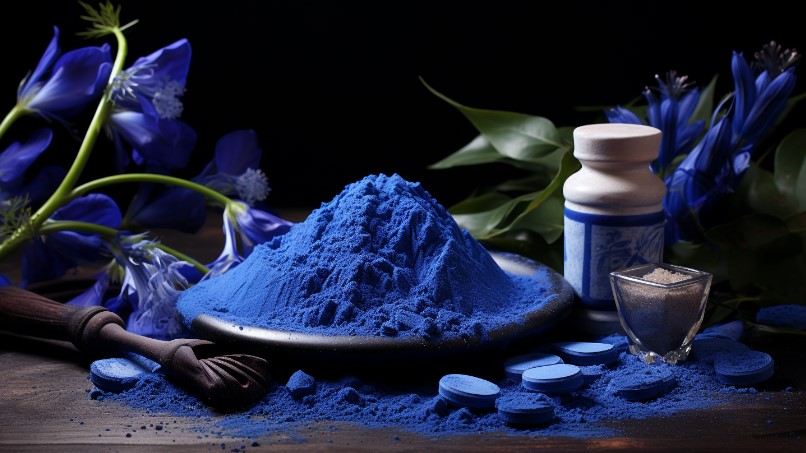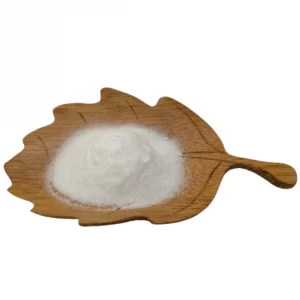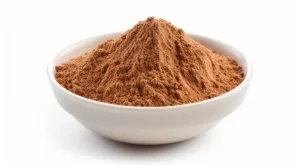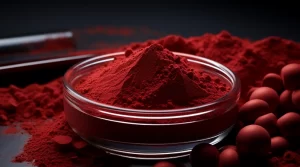Verständnis von Phycocyanin

Phycocyanin,Mention of blue, you may think of the rough sea, will see the quiet blue sky, will think of the “sunrise river red fire, spring to the river water green as blue” Jiangnan scenery, will feel Han Yu “where the cloud cross Qinling, snow blue pass horse” hero lost way of sadness….. Blue is quiet, is melancholy, is calm, is also elegant. Today we are going to learn about the blue in nature, phycocyanin.
Blue in nature
As we all know, the three primary colors of nature are red, yellow and blue. Blue is given a lot of meaning, and blue is also the main collocation of a variety of shades. In nature, natural blue pigment is rare as a treasure, and it is not easy to find a safe and reliable natural blue raw material that can be used in the food industry. At present, the blue pigments allowed in the “National Standards for Food Safety” are bright blue, algae blue, gardenia blue and so on. Among them, bright blue and algal blue are widely used.
Brilliant blue
Bright blue, also known as edible Cyan No. 1, edible blue No. 2, is a water-soluble non-azo colorant. It is an organic compound with the molecular formula C37H34N2Na2O9S3 and a relative molecular mass of 792.84. Bright blue is an edible blue pigment, which is a synthetic pigment and a water-soluble non-azo food additive. It is prepared by condensation and oxidation of benzaldehyde o-sulfonic acid and N-ethyl-N – (3-sulfonyl benzyl) -aniline. It can be used as colorant in food, medicine, cosmetics and other industries. In the food industry, it is suitable for the coloring of pastries, candies, beverages, etc. Long-term and excessive intake may have adverse effects on the body. According to the test, the daily allowable intake of the human body is 0-12.5mg/kg, if excessive consumption, there may be allergies, indigestion, lack of concentration, cancer and other risks. The experiment shows that the temperature change has little effect on the stability of bright blue, and the high heat resistance is good, and the highest heat resistance temperature is 283 degrees. In China, most of the food industry will choose bright blue because of its low cost, strong coloring power and good stability. Although the amount added is not large, the cumulative consumption will still have adverse effects on the body.
Quelle der Phycocyanin
Phycocyanin, a dark blue powder isolated from spirulina, is the main functional protein in spirulina, accounting for 20% of the dried base of spirulina. It is mainly found in cyanobacteria, red algae and crypto-algae. Phycocyanin, also commonly divided into C-phycocyanin and R-phycocyanin, is both a protein, an excellent natural food coloring, and a good health food. It is soluble in water, has fluorescence, is the United States FDA approved natural blue pigment
. Phycocyanin is rich in high-quality protein and 8 amino acids required by the human body, and is a micronutrient that is easier for the human body to recognize and absorb, and has high nutritional value, so it is known as “food diamond”.
Structure of phycocyanin
Phycocyanin is a protein molecule found in cyanobacteria and algae. Its structural formula consists of four blue pigment groups, forming a large ring structure. Each pigment group consists of a blue benzopyrrole ring and a green pyrrole ring. These four pigment groups form connections with residues of other proteins through carboxyl groups on the benzene ring. The whole molecule is disc-shaped and can absorb light of longer wavelengths. Phycocyanin powder products are relatively stable and can be stored sealed at room temperature. The dissolved liquid product becomes unstable beyond 60 degrees.
Many small partners are prone to fading when doing products, it may be that the temperature is high, so that phycocyanin is no longer stable, in addition, oxidation will also lead to phycocyanin discoloration, stable in weak acid and neutral conditions (PH4.5–8), precipitation occurs when acidic (PH < 4.2), strong alkali can be decolorized.
Extraction of phycocyanin
Phycocyanin Wall breaking method
Common mechanical wall breaking methods are swelling method, repeated freeze-thaw method, ultrasonic assisted wall breaking method, high pressure homogenization method, tissue grinding method, as well as chemical solvent method, biological enzyme method and so on. Pulsed electric field and resistance heating methods have also been used in cell wall breaking to extract phycocyanin in recent years.
Phycocyanin Precipitation
When phycocyanin is dissolved in the extraction solution after the algal cells are broken, it is very important to select an appropriate method for precipitation. Isoelectric point precipitation is to make use of the characteristic of the minimum solubility of protein at the isoelectric point by adjusting the solution pH value to the isoelectric point of phycocyanin to reduce the solubility of phycocyanin and precipitate it.
Phycocyanin Purification
There are many components in the crude extract of spirulina, both. Including polysaccharides, proteins, mineral salts, etc., but also including other functional components (chlorophyll, carotene, vitamins, gamma-linolenic acid, etc.), the phycocyanin in the crude extract needs to be purified to a certain purity to meet different needs. The common purification methods of phycocyanin include salt-out precipitation, membrane filtration, two-phase aqueous extraction, free flow electrophoresis, column chromatography, etc. High purity phycocyanin can be obtained by the combination of several purification methods.
The benefits of phycocyanin
Phycocyanin Antioxidant effect
Phycocyanin has a strong antioxidant effect, which can neutralize free radicals and protect cells from oxidative damage.
Phycocyanin Reduce blood pressure
phycocyanin has a certain effect of lowering blood pressure, which can improve the blood pressure level of hypertensive patients.
Phycocyanin Lower cholesterol
Phycocyanin can lower cholesterol levels and help prevent cardiovascular disease.
Phycocyanin Improve cognitive function
Phycocyanin can promote the growth and development of nerve cells, helping to improve cognitive function and prevent Alzheimer’s disease.
Phycocyanin Verbesserung der Immunität
phycocyanin can enhance the activity of immune cells and enhance immunity.
Phycocyanin Improve sports performance
Phycocyanin can improve oxygen utilization efficiency, increase exercise endurance and delay fatigue.
Application of phycocyanin
With the increasing demand for food safety and health, phycocyanin has a more and more extensive application prospect in food field. Phycocyanin can be used for coloring and staining of various foods. Compared with traditional synthetic pigments, phycocyanin is healthier and more natural, and is favored by more and more consumers. Phycocyanin can be used as a natural pigment in foods and beverages, such as blue candy, ice cream, beverages, etc. In October 2021, Euloz launched phycocyanin yogurt, which detonated the entire fruit fishing market, and various stores flocked to the new, and everyone on the street had a cup of blue yogurt. So far, phycocyanin is still one of the most popular whipped yogurt.
Kosmetika
Phycocyanin can be used as a natural pigment in cosmetics, skin care products and other cosmetics, giving products natural blue color, enhance the beauty of products and market competitiveness.
Pharmaceutical field: In the growing market of health demands, phycocyanin is favored by the public for its comprehensive nutrition and rich functions. Phycocyanin has strong antioxidant and anti-inflammatory effects, which can be used in the research and development and production of antioxidants, immune enhancers and other drugs. It has significant effects in enhancing immunity, anti-inflammatory, anti-cancer, blood tonic, liver protection, ovary protection, and increase of white blood cells, and has high medicinal value.
Biotechnology
Phycocyanin can be used as a biofluorescent probe, protein stain and other applications in the field of biotechnology, which is of great help to life science research.
Environmental protection field
Phycocyanin can be used in water quality testing, environmental pollution monitoring and other fields, with high sensitivity, high selectivity and other characteristics.
Energy field
Phycocyanin can be used in solar cells and biofuel cells, with high photoelectric conversion efficiency and electrochemical activity.
Phycocyanin Manufacturer /Phycocyanin Manufacturers/ Phycocyanin Supplier /Phycocyanin Suppliers/Phycocyanin Factory
Phycocyanin supplier: www.backvita.com
E-Mail: [email protected]
Telefon: +86 (029) 8187 2325



